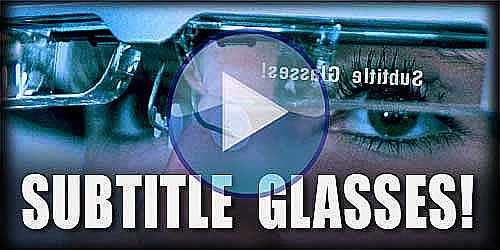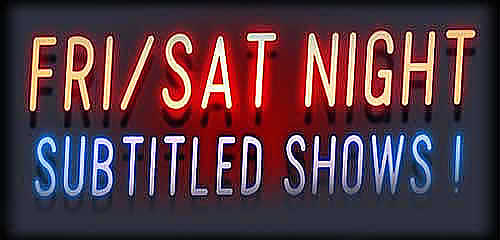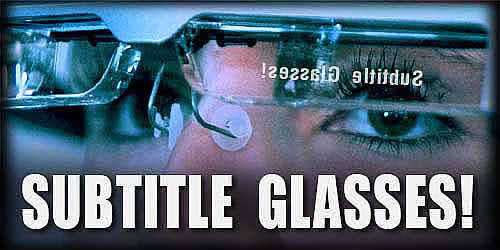
"Accessible, subtitled/captioned cinema shows provide social benefits such as equality and inclusion. For a few hours, the disabling barrier is removed, enabling film fans with hearing loss to enjoy, rather than endure the cinema experience"
Latest info:
Feb 2020: Event finished. Watch this space for developments.
FREE tickets to London screenings to try out subtitle cinema glasses!
Sessions: Sat 11 Jan 5.20pm, Mon 13 Jan 8.45pm, Wed 15 Jan 8.50pm, Thur 16 Jan 8.45pm
BFI Southbank, London. Nearest station: Waterloo.
Bookings must be made by emailing events@shortfilms.org
NOTE! These screenings are OVER 18's ONLY, because the films have yet to be rated by BBFC.
Full details on the films HERE
NOTE! If a screening looks sold out on the BFI website, it is possible there will be dedicated spaces for subtitle glasses users so email events@shortfilms.org to confirm availability.
More details on the subtitle glasses trials below.
Jan 2020: National Theatre’s smart caption glasses to be piloted at BFI for London Short Film Festival 2020
11-16 January 2020, the London Short Film Festival (LSFF) will host the first UK pilot in cinemas of the National Theatre’s smart caption glasses, a solution for D/deaf, deafened or hard of hearing audiences, at BFI Southbank.
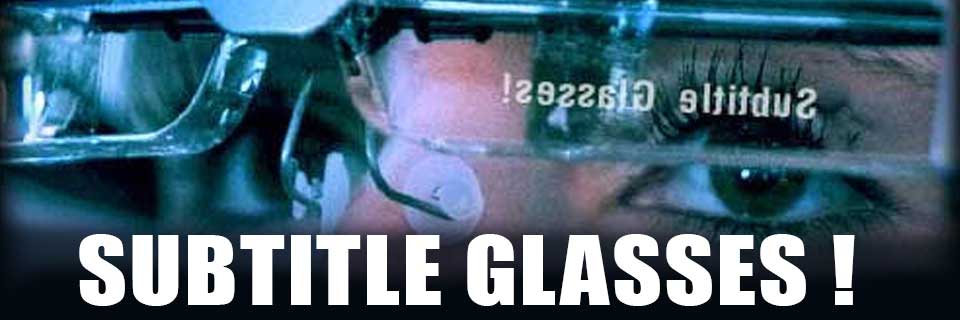
As part of the festival’s ongoing commitment to accessibility, LSFF is delighted to announce that smart caption glasses will be available to cinema-goers at all LSFF 2020 UK Competition screenings with support from the BFI Audience Fund (awarding funds from The National Lottery), BFI Southbank, National Theatre, Epson and the UK Cinema Association’s Technology Challenge Fund.
Launched in 2018 by the National Theatre (NT), following a year of testing with audiences who are D/deaf, deafened or hard of hearing, smart caption glasses have been in use for 80% of their productions on the South Bank.
The Open Access Smart Capture technology was the result of an ongoing collaboration between the NT’s technical team and speech and language experts led by Professor Andrew Lambourne.
The glasses display a synchronised transcript of dialogue and sound directly onto the lenses of the glasses, giving service users the freedom to experience captions how and when they want to. Accenture and the NT developed the service using Moverio BT-350 smart glasses, which are designed and manufactured by Epson specifically with arts and culture applications in mind.
Including work from Peter Strickland (In Fabric), a poignant turn from Maxine Peake (Funny Cow) and the directorial debut of Lena Headey, the LSFF 2020 UK Competition selection presents compelling storytelling from established and emerging British directors across four screenings on 11th, 13th, 15th & 16th January in NFT1 at BFI Southbank.
With 11 million people living with hearing loss across the UK – around one in six of the population – LSFF has been hosting annual screenings in London and across the UK for underserved Deaf and hard of hearing audiences for the past three years, curated by LSFF’s Deaf programmer Zoe McWhinney.
Over the last decade, the UK cinema sector, with the support of the UK Cinema Association, has worked hard to meet the needs of deaf and hearing-impaired audiences, increasing the number of subtitled screenings significantly. There are now over 1,500 subtitled screenings in UK cinemas every week. But the delivery of such ‘open caption’ shows, where the subtitles are visible to audience members whether they need them or not, remains a challenge, particularly for smaller cinema operators.
A further development of the Technology Challenge Fund, launched by the UK Cinema Association in Oct 2018 to find an affordable and inclusive solution to the delivery of subtitles for deaf and hard of hearing people, the pilot will see the first test of the National Theatre solution in a ‘live’ cinema environment.
Booking details: A limited number of smart caption glasses will be available for booking at the following LSFF UK Competition screenings:
A Little Tenderness – Saturday 11th Jan, 5.20pm, BFI Southbank
Concealment Feeds the Fear – Monday 13th Jan, 8.45pm, BFI Southbank
In Living Colour – Wednesday 15th Jan, 8.50pm, BFI Southbank
Joyful & Triumphant – Thursday 16th Jan, 8.45pm, BFI Southbank
NOTE! These screenings are OVER 18's ONLY, because the films have yet to be rated by BBFC.
Bookings must be made by emailing LSFF on events@shortfilms.org
Or book HERE
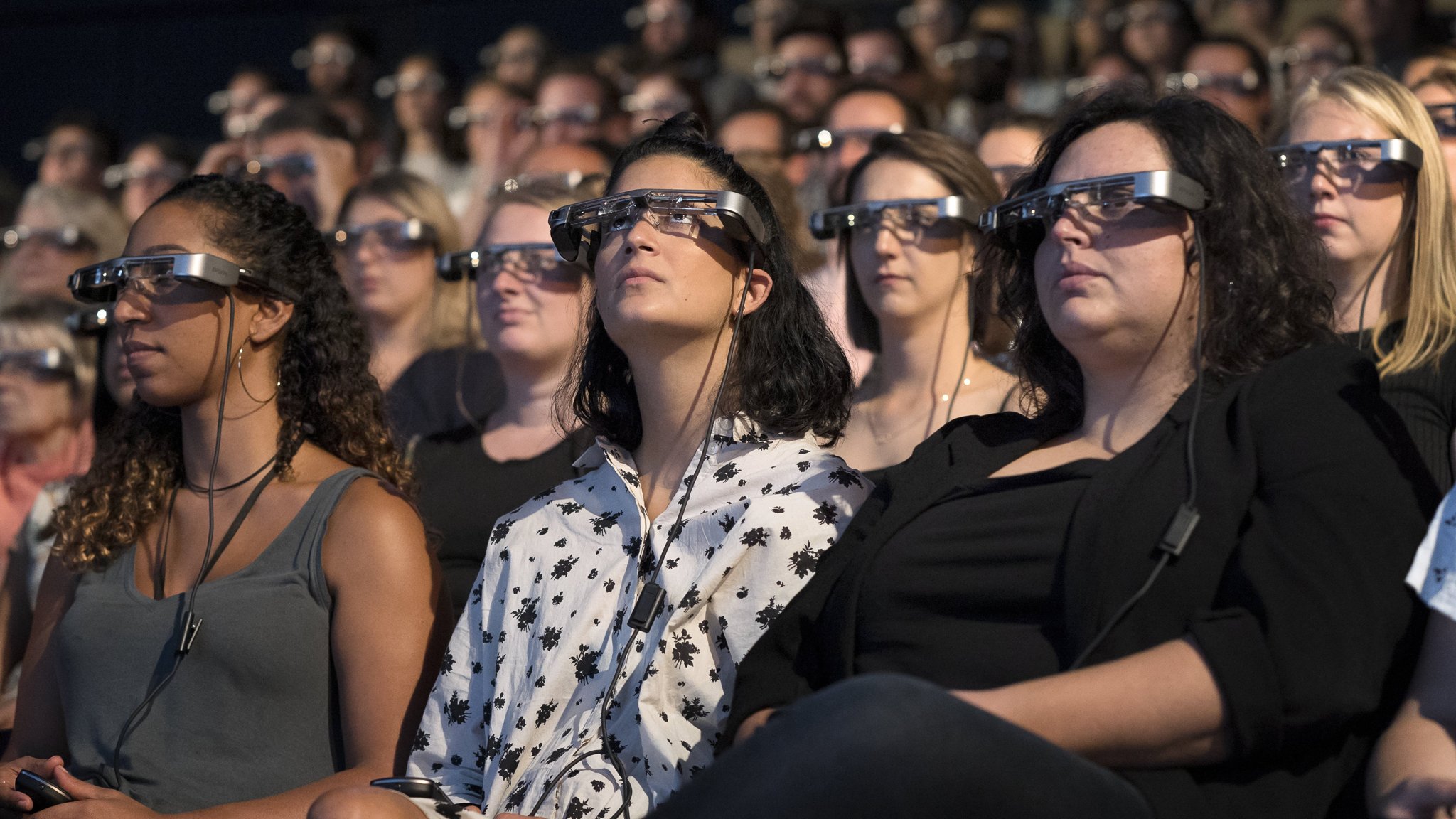
Sarah Chorley, Festival Director, London Short Film Festival, said:
“LSFF is an experimental festival that pushes boundaries in cinema, and so we are delighted to host the first chance for UK cinema audiences to trial smart caption glasses, a technology which promises to bring accessibility and choice to deaf and hard of hearing audiences at the pictures. The pilot during London Short Film Festival 2020 will present this cutting edge technology as an excellent access option for cinemas and audiences alike.”
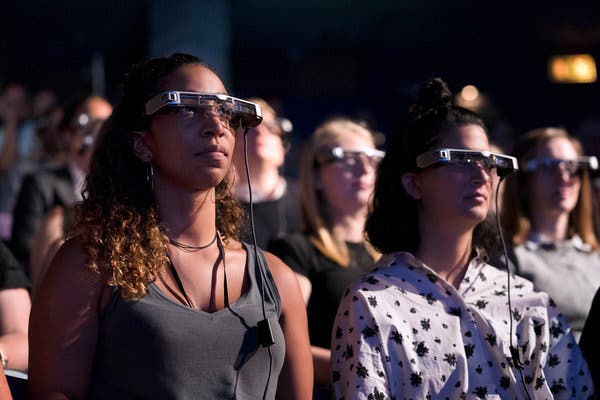
Welcoming the planned pilot, Phil Clapp, Chief Executive, UK Cinema Association said:
“It’s hugely exciting to have reached this milestone in the progress of our Technology Challenge Fund; the first genuinely live in-cinema of the National Theatre’s subtitling glasses solution. Our aim all along has been to help develop technology which can overcome many of the barriers of the current ‘open caption’ approach and make the cinema experience more accessible and inclusive for those who are deaf or hard of hearing. This next step we hope brings that outcome a little closer and we look forward to working with the team behind the technology and colleagues at LSFF and the BFI to make it a reality.”
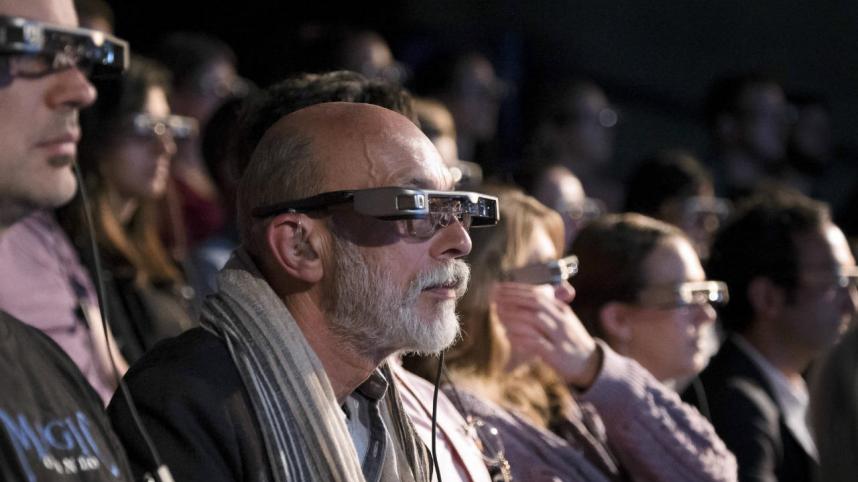
Ben Luxford, Head of UK Audiences, BFI, said:
“The BFI Audience Fund exists to support a range of screening activities to help increase access and boost inclusivity to reach new audiences, so we are excited to fund this proposal from the London Short Film Festival. We welcome their ambition and ingenuity to road test and push forward the Open Access Smart Caption solution which could potentially radically improve the cinema experience for millions of people living with hearing loss across the UK. Although we recognise it’s not a perfect solution, it’s certainly a significant step in the right direction.”
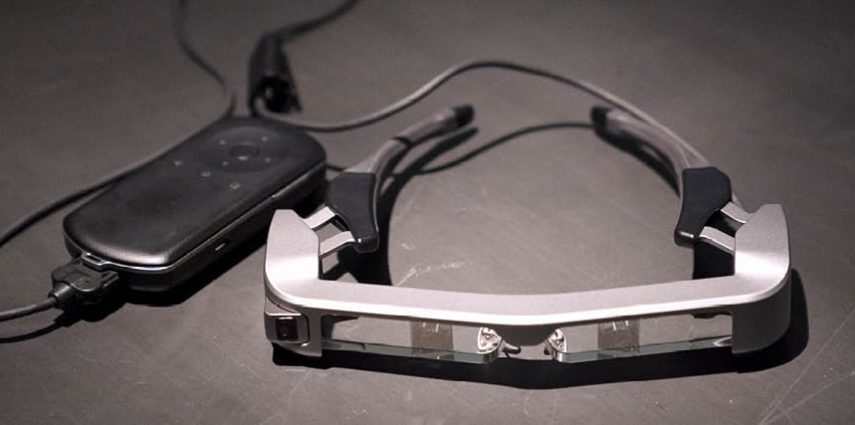
Jonathan Suffolk, Concept Designer and Project Director for the smart caption glasses at the National Theatre, said:
“When we began developing the smart caption glasses in 2014, we were not only determined to transform how our audiences at the National Theatre were able to access our work but always had the vision that the glasses could transform access to arts, entertainment and culture more widely. This feels like a really exciting step towards that ambition – we’re really pleased to be working with BFI, UK Cinema Association and the London Short Film Festival on this exciting pilot in cinemas.”
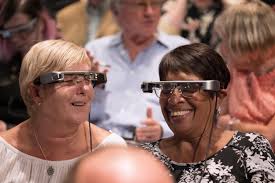
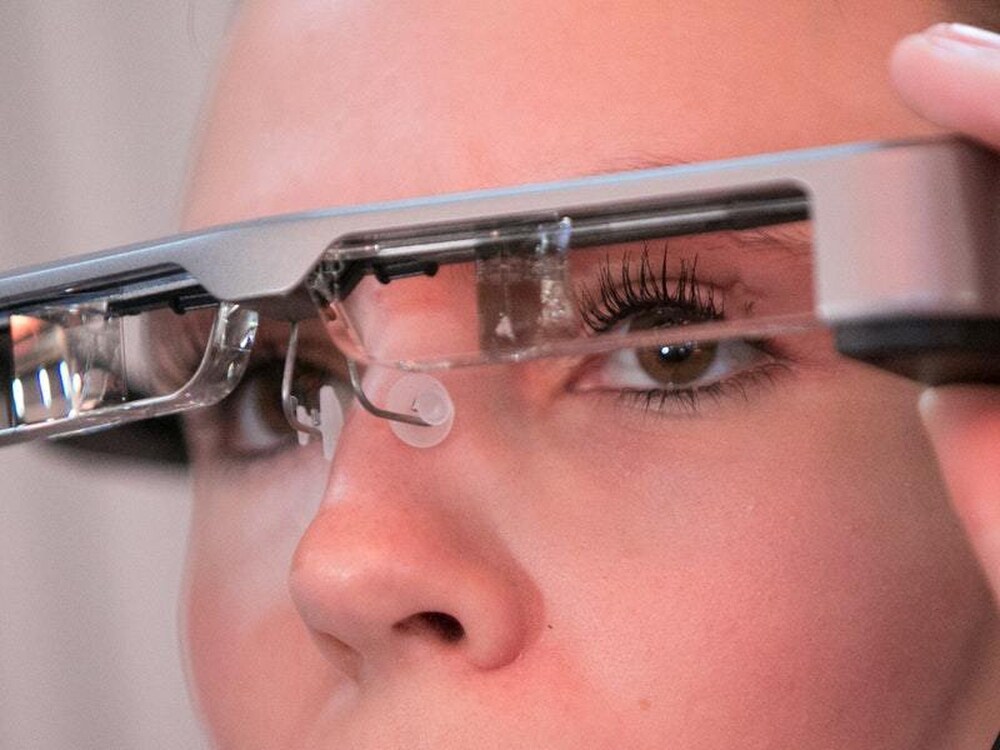
Press release HERE
Videos:
BBC News video HERE
Instructional video HERE
PREVIOUSLY:
Sep 2019: Technology that drives accessibility - update on progress HERE (pdf)
"...accessibility still remains an area where ever-increasing audience expectations present an ongoing challenge. But it is also one area where the latest technologies can offer innovative solutions for cinema operators ... acknowledged the business opportunity that this audience represents — currently one in six of the UK public identifies as having some form of hearing difficulty ... ‘open captions’ are perhaps unlikely ever to deliver the number and range of subtitled screenings necessary to meet demand ... the general audience does not ordinarily like films projected with open captions ... most cinema operators face the dilemma of wanting to do more, but knowing that the greater provision of subtitled screenings, particularly at busy times, will result in them taking a box office ‘hit’ ... Conscious of increasing pressure to deliver more in terms of subtitling (and of the potential economic impacts of doing so under the current approach), the UKCA sought to open the conversation up ... an offer of development funding to the best or most promising solutions ... almost 20 proposals were received ... input not just from an expert panel of colleagues from across the cinema industry, but also a user group, convened by Action on Hearing Loss, consisting of a number of deaf and hearing impaired cinema-goers (amongst whom were some of the most outspoken critics of the industry’s approach to date). ... The expert panel looked at the different proposals from a viewpoint of operational and economic feasibility ... The latter [user] group was clear about what it wanted to see from any solution, specifically something which was inclusive, not singling out audience members as a result of disability and applicable across the widest possible range of film releases ... a significant amount has been allocated to each of three short-listed solutions, the aim being (where relevant) to develop a prototype ready for further ‘field testing’. Two of those solutions rely on a subtitling glasses solution ... the other offers an interesting take on the secondary screen approach, albeit without it is anticipated any significant need for investment by the cinema operator"
May 2019: Three proposals short-listed: Two glasses/app solutions and one secondary screen/app solution.
UKCA Press release:
"The UK Cinema Association has today confirmed the next steps on their pioneering Technology Challenge Fund, established to stimulate technological innovation that will allow people with hearing loss to have a more inclusive cinema experience.
"The Fund was launched in partnership with Action on Hearing Loss in Oct 2018, with an ‘invitation to apply’ which saw over a dozen different applications offering a range of different potential solutions to the challenge. Following extensive consideration by an expert panel of industry professionals and a ‘user panel’ of deaf and hard of hearing cinema-goers, three proposals have now been short-listed for the first round of funding. Two of these – put forward by the National Theatre and Greta & Starks respectively – involve the use of assistive eyewear, while the third – proposed by Screen Language relies on a secondary screen.
"The availability of subtitled screenings has long been an issue of contention. While subtitles are a vital solution for many who are deaf or hard of hearing, the reluctance of many cinema-goers to attend such screenings means that offering widespread provision is challenging for many cinema operators.
"The provision of ‘closed’ captioned subtitles – where text is only visible to the individual on a personal device such as a screen or specially-adapted glasses, has long be seen to offer one way forward. Commenting on this latest development, UK Cinema Association Chief Executive Phil Clapp said: “While there is still a great deal of development work and testing to be done, we have been pleased by the quality of the proposals put forward and are hopeful that at least one of the short-listed applications will eventually provide a viable solution.” Jesal Vishnuram, from Action on Hearing Loss added: “Action on Hearing Loss are committed to supporting the development of new and innovative technology to improve the lives of people with hearing loss. The Cinema Subtitle Challenge Fund is a great collaborative venture that has led to some very exciting opportunities to genuinely improve the cinema experience for people with hearing loss.”
"While each of the final three solutions are at varying stages of development, the next step will be to arrange a practical demonstration to assess the operational viability of the proposal before further funding and R&D takes place."
Full details below. Watch this page for developments/updates.
Previously...
UKCA Conference. March 6th 2019:
'UKCA proposals for viable closed caption solutions for deaf and hard of hearing customers. This session will invite the four short-listed applicants to explain and – where possible – demonstrate their proposals'
Previously...
£75,000 CINEMA SUBTITLING CHALLENGE FUND!
"The UK Cinema Association and Action On Hearing Loss are excited to launch this new challenge fund"
...the development of a solution that will allow people with hearing loss to have a more inclusive cinema experience ... help to find a suitable commercial partner to develop and create a market-ready product ... cinemas committed to trialing any viable solutions ...
The UK cinema industry will support the development of a solution that will allow people with hearing loss to have a more inclusive cinema experience. Up to £75,000 is available to support innovative projects in this competition.
Should a suitable and viable product be developed that the UK cinema industry approves and meets the desired criteria set out in the aims and objectives (below), 'Action on Hearing Loss' will help to find a suitable commercial partner to develop and create a market-ready product. The three largest UK cinema chains (Odeon, Cineworld and Vue) are committed to trialing any viable solutions arising from this process and there are potential routes to European and International markets (such a solution could also provide foreign language subtitle tracks - a vast and currently untapped market). The successful applicant will have full Intellectual Property (IP) ownership and will take a percentage of the revenue from product sales.
Closing date for applications is Friday 28 September 2018. People working alone, or in collaboration with others, in organisations of any size are welcome to apply. The fund is open to anyone who can demonstrate their capabilities in this field by completing an application form, and attending a launch workshop in London on 10 Oct 2018, and further events later in the process as appropriate.
The ideal solution cannot be prohibitively expensive - it must:
• Allow people to view subtitles without disturbing other viewers who do not want to view subtitles;
• Be financially viable for cinemas to install and use;
• Utilise subtitle files that are affordable for film distribution companies, and are compatible with existing cinema infrastructure and technology;
• Be easy to use for both the cinema and audience member;
• Be robust enough to withstand repeated use, and capable of straightforward maintenance.
Up to £75,000 is available to support innovative projects in this competition. This is initially divided across two phases:
Phase 1 up to £25,000 available (to a limit of £5,000 per project);
Phase 2 up to £50,000 available (to a limit of £25,000 per project)
Phase 1:
Entrants will be expected to demonstrate the technical feasibility of their proposed innovation. Projects can range in size up to a total cost of £5,000. Proposals must be completed within eight weeks.
Phase 1 applicants will be invited to a ‘development workshop’ at which they can refine and discuss their initial ideas with industry experts.
Phase 1 proposals will be judged by an independent panel which will be supported by technical peer review.
Phase 2:
Phase 2 is only open to applicants that have completed Phase 1 and successfully demonstrated that their concept is technically feasible. In Phase 2, entrants will develop and test a working prototype in a ‘real life’ cinema. Projects can range in size up to £25,000 and can last up to six months.
Phase 2 applicants will be given access to a cinema to allow testing during the development of the prototype and will have access to a technical expert to help ensure that the final solution is technically compatible with existing cinema infrastructure.
Phase 2 proposals will be judged by an independent panel
A showcase event will be held at the end of the process at which successful prototypes will be demonstrated to relevant stakeholders, including people with hearing loss, cinema operators and potential partners able to support the commercialisation and/or adoption of the most promising solution.
Timetable
2018
June – September: Application to express interest to be involved
10th Oct: Launch workshop
November: Development paper for Phase 1 grant
December: £5,000 Phase 1 grants awarded
2019
February: Phase 1 closes
April: £25,000 Phase 2 grants awarded
September: Phase 2 closes
November: Showcase event
A panel of ten film industry professionals and one deaf Action On Hearing Loss patron, and a user panel of people with hearing loss will help guide and provide input at every stage of the Fund to ensure that the chosen solution meets the required criteria.
To apply, please download and complete the PDF application form HERE (Deadline passed)
Please return completed forms to info@cinemauk.org.uk (Deadline passed)
"The goal is a solution that hearing-impaired customers can use to give a better overall experience" More info: ChallengeFundArticle.pdf
"The UK Cinema Association and Action On Hearing Loss are excited to launch this new challenge fund" Full details HERE
YourLocalCinema - Report on UK Accessible Cinema
Last year, more than 900 films were released. More than 20 UK film distributors spent around £500,000 producing almost 200 subtitle/caption/narration tracks to enable cinemas to provide accessible shows from release date.
Last year almost 100 cinema companies provided 75,000+ English-language subtitled/captioned shows of almost 200 films in 600+ cinemas across the UK & Ireland. Three cinema companies - Odeon, Cineworld and Vue - provided around 70% of accessible shows. In 2019 there were more than a million admissions to these accessible shows. £8m+ worth of tickets. Attendance to accessible shows has tripled over the last decade. An estimated 6m tickets - £35m worth - have been issued to date.
Before 2000, the only way people with hearing loss could enjoy cinema was to watch a foreign-language film. Today, thanks to collaborative work between the UK film industry, YourLocalCinema, and charities representing disabled people, most cinemas are accessible. Thousands of customers with hearing loss regularly attend cinemas with their friends & families.
Accessible cinema shows have made a positive, cultural, long-term impact on society. They benefit people of all ages. Each year in the UK, hundreds of children are born with significant hearing loss (NDCS). It's estimated that more than ten million, including thousands of young people, have hearing loss (AOHL). Our society is ageing, and with ageing, loss of some hearing is inevitable. Access to film - via subtitles - is something that we may all appreciate, eventually.
INCLUSIVE / ADAPTIVE SOLUTIONS TO CINEMA ACCESS
"Inclusion can mean different things to different people. A person with hearing loss may feel included when hearing people join that person at a screening where subtitles are on-screen, for all to see. A hearing person may feel they are being inclusive by providing an adaptive aid that enables the person with hearing loss join them in a regular, non-subtitled show"
'Personal' subtitle/caption adaptive aids - glasses, screens and smartphone apps - exist and are in use in cinemas in the US, Australia and some European countries. Subtitle glasses are available for theatre shows at the National Theatre in London. Some of these solutions have been evaluated by the UK cinema industry. Although all can significantly increase access to the cinema for customers who need subtitling, Many cinemas are closed, due to coronavirus-related restrictions. All cinemas can screen the latest films with subtitles - when open! Check actual cinema websites for the latest info. fully met the criteria set out in the key objectives of the UK cinema industry's 'Challenge Fund' detailed above.
US and Australian cinemas have (with the help of human rights laws) transitioned from 'on-screen' subtitles (the current UK method) to subtitle glasses and seat-mounted displays. These 'adaptive aids' enable cinemas to offer a vastly increased choice of accessible shows. Subtitles are invisible to the general audience - only the wearer/user sees them. In theory, with a personal subtitle solution, ALL shows can be accessible. All can be enjoyed by people with or without hearing problems.
The National Theatre in London is currently trialling subtitle glasses, as part of its efforts to reach more people and widen the diversity and range of its theatre audience. It's hoped that the glasses will increase opportunities for people with hearing loss to attend. “This is transformative … many, many more people will be able to enjoy our shows” (Jonathan Suffolk, technical director).

Latest info: Jan 2020: National Theatre’s smart caption glasses to be piloted at BFI for London Short Film Festival 2020 click HERE for details.
Smartphones can also be personal access solutions, via a variety of free apps. Some European cinemas allow these apps to be used (if dimmed and silent) but as yet, no official infrastructure is in place to synchronise/stream a subtitle track from a cinema server to a phone.
An Italian cinema has utilised smart glasses in conjunction with a smartphone app to display subtitles, to enable its customers with hearing loss to enjoy films.
Most personal adaptive aids can also receive audio description (AD) tracks, via a standard headphone socket, enabling customers with sight loss to use their own, familiar, regular headphones to experience the isolated AD narration track, rather than the current choice of cinema-supplied, over-the-ear headphones (which can block out the 'regular' film soundtrack that's delivered via cinema surround speakers). In 2017 the UK cinema industry tested an audio description app that can also be utilised as a subtitles app.
A robust, stable personal adaptive aid could help reduce the number of scheduling/operational issues that can sometimes occur with 'special/out of the ordinary' shows. If a subtitle track is 'on', all of the time (but can only be seen by customers using a personal device), the chances of a member of staff failing to set it to 'on' for a scheduled show are reduced. Mistakes rarely happen (only a handful of the 1,500+ weekly English-language subtitled shows go wrong), but the consequences of an abruptly-cancelled show can be very serious. Customers that depend on subtitles for their film enjoyment can't just wait for the next show, or come back tomorrow, or next week. They will often have had only ONE chance to enjoy the film on the big screen. They may have travelled far and incurred costs.
The potential reach of personal subtitle solutions is huge. With built-in multi-language features, subtitles could be broadcast in a choice of languages that are popular in the UK. Feedback to YourLocalCinema: "This is not a complaint. Thought you might like to know of our experience attending a subtitled film in Salisbury. Upon arriving, having travelled 21 miles from home, there was a notice on the door stating, "Sorry, 'Theory of Everything' is sold out" ... Unfortunately for us, 93 Spanish language students had booked. Kind regards and thanks for all you do"
A personal 'always on' access solution could bring cinemas in line with home entertainment access levels. They may never be as good as what deaf people are used to on TV/internet - on-screen subtitles, but tech solutions can provide 100% access to all cinemas, all screens, all popular films, all days & times. Eventually, accessible shows could be ubiquitous access facilities - like beeping traffic crossings, audio/text bus/train announcements, disabled toilets/parking spaces, ramps, elevators, wheelchair spaces etc.
"It is hoped that medical science will eventually decrease the amount of younger people with hearing loss. The potential audience for accessible cinema may never be substantial, but it's a paying audience, and its members expect and deserve to be treat as equals. It may take years, but ultimately, it's this appreciative audience that will fund any 'access' solution, via tickets & popcorn sales"
YourLocalCinema
index.html
Email: subtitles@yourlocalcinema.com
Twitter: https://twitter.com/yourlocalcinema/likes
Facebook: https://tinyurl.com/YLCFacebook
Text message: +44 7931341377
WhatsApp: whatsapp://send?abid=yourlocalcinema&text=Hi
Online Chat: https://tinyurl.com/YLCChat
Phone: 0845 0569824
YouTube subtitled trailers: trailers.html
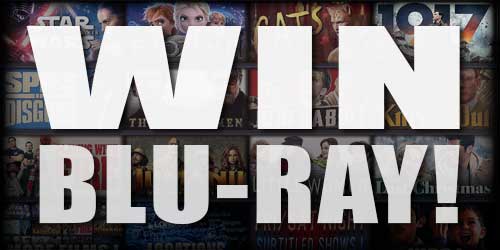
![]() Query? Complaint? Feedback? Click HERE to comment and enter a free draw to win a 2020 Blu-Ray or DVD of your choice!
Query? Complaint? Feedback? Click HERE to comment and enter a free draw to win a 2020 Blu-Ray or DVD of your choice!
Accessible shows provide social benefits such as equality, inclusion and community integration. For a few hours, the disabling barrier is removed. There were more than a million admissions to accessible shows last year!
Supported by UK film distributors and BFI. Read about our sponsors HERE
© Your Local Cinema. Click for Privacy Policy. All rights reserved








